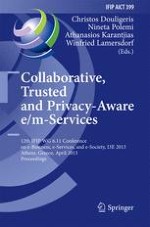2013 | Book
Collaborative, Trusted and Privacy-Aware e/m-Services
12th IFIP WG 6.11 Conference on e-Business, e-Services, and e-Society, I3E 2013, Athens, Greece, April 25-26, 2013. Proceedings
Editors: Christos Douligeris, Nineta Polemi, Athanasios Karantjias, Winfried Lamersdorf
Publisher: Springer Berlin Heidelberg
Book Series : IFIP Advances in Information and Communication Technology
